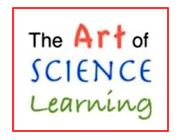Conferences: Art of Science Learning
 The Art of Science Learning explores ways in which the arts can help improve how people of all ages learn the sciences. Using hands-on, imaginative approaches to science education, with many of the methods found in the creative arts, the Art of Science Learning is convening scientists, artists, educators, business leaders, researchers, and policymakers in three conferences in Spring 2011. The conferences will explore how the arts can be engaged to strengthen STEM skills and spark creativity in the 21st-Century American workforce. The events will showcase interdisciplinary methods and techniques used by educators and artists, share the results of current research into the impact of arts-based approaches to science education, and explore the connection between the arts and American economic competitiveness.
The Art of Science Learning explores ways in which the arts can help improve how people of all ages learn the sciences. Using hands-on, imaginative approaches to science education, with many of the methods found in the creative arts, the Art of Science Learning is convening scientists, artists, educators, business leaders, researchers, and policymakers in three conferences in Spring 2011. The conferences will explore how the arts can be engaged to strengthen STEM skills and spark creativity in the 21st-Century American workforce. The events will showcase interdisciplinary methods and techniques used by educators and artists, share the results of current research into the impact of arts-based approaches to science education, and explore the connection between the arts and American economic competitiveness.
Cost: $200 per person for each conference
The conferences will be held:
April 6-7, Washington, DC: The Smithsonian’s National Museum of American History
May 16-17, Chicago: Illinois Institute of Technology
June 14-15, San Diego: California Institute of Telecommunications and Information Technology (CALIT2) at the University of California San Diego, in collaboration with the San Diego Science Alliance
Conference Design
The conferences will focus on three key areas:
1. Educational Practice. Demonstrations by educators of hands-on workshops, new tools and resources that have proved effective, and a variety of successful pedagogical approaches that integrate arts-based learning into science education
2. Workforce Development. Explorations and real-world examples of the roles that creativity, critical thinking, and collaborative and communication skills play in STEM skill development. Business leaders and educators will discuss and demonstrate ways in which the arts can be used to strengthen these key elements of a competitive 21st-Century American workforce.
3. Research. What do we know and what do we not yet know about how arts-based learning can most effectively contribute to science education, STEM skill development, and an innovative and competitive American workforce? These sessions will outline a research agenda for further quantitative studies.
The conferences will also feature interactive and arts-based plenary activities by some of the world’s leading practitioners of arts-based learning. These activities will give participants first-hand experience in how artistic skills, processes and experiences can foster creative thinking and interdisciplinary collaboration.
Who Should Attend?
The conferences are designed for the following sectors (please view and distribute fliers for different audiences)
* Science educators working in formal and informal settings (museums, media, after-school programs, camps, schools, and more),
* Teaching artists and arts teachers in all disciplines,
* Museum Professionals,
* Corporate leaders and policymakers interested in strengthening the scientific literacy, innovative capacity and competitive position of the 21st-Century American workforce , and
* Scientists, mathematicians, engineers and artists pursuing interdisciplinary arts/science integration
Along with the conferences and a research agenda, a third outcome of the Art of Science Learning will be the building of a “community of interest” among those using the arts in teaching the sciences, whether in museums, schools, the media or other forms.
The Art of Science Learning is partly funded by the National Science Foundation.
For more information and/or to register to attend the conferences, click here.
Filed under: For Teachers, K-12 Outreach Programs
Tags: Art, Art and Engineering, Collaborative Activity, Conference, Conferences and Meetings, National Science Foundation, Programs for Teachers, Teachers








